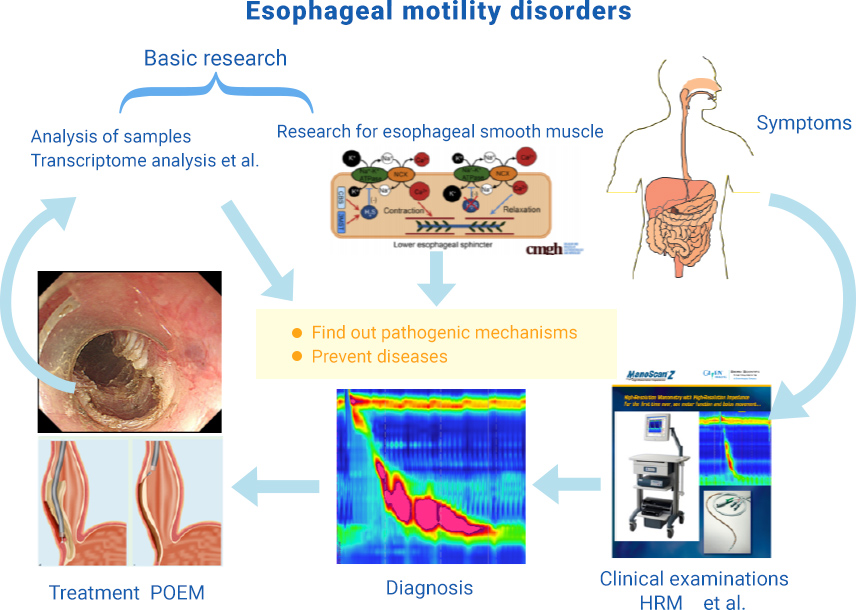Our Laboratories
Gastroenterology
About us
The laboratory of gastroenterology (GI) provides a specialist service for patients with diverse diseases in the upper and lower gastrointestinal tracts. We consists of a dedicated team of medical doctors who provide inpatient and outpatient care services at the Kyushu University Hospital, and research scientists and graduate students who conduct basic/clinical researches in the areas of gastroenterology in the Graduate School of Medical Sciences, Kyushu University.
We are part of the Department of Medicine and Bioregulatory Science, Kyushu University, where five specialized units of internal medicine (endocrinology, hematology, hepatology, pancreatology, and GI) team up and work together to provide best healthcare solutions.
Clinics
We provide diagnosis and treatment for all diseases in the gastrointestinal tract.
Such as
- Gastrointestinal motility disorders
- Inflammatory bowel diseases (IBD)
- Gastrointestinal neoplasms
Esophageal motility disorders, such as esophageal achalasia, distal esophageal spasm (DES), and esophagogastric junction outflow obstruction (EGJOO) are not commonly known, but these are actually routinely diagnosed in patients who have symptoms in the upper GI tract. We monitor the movement of esophageal muscles using a device called high-resolution manometry, which measure the pressure inside the esophagus. We also measure the pH levels in the esophagus and stomach (impedance test), which tell us the presence of gastric acid reflux. For patients with a severe esophageal stricture that is resistant to medications, we perform endoscopic surgery called POEM (peroral endoscopic myotomy). Only a handful of hospitals in Japan could provide such systematic diagnostic and therapeutic solutions for the esophageal motility disorders.
Inflammatory bowel diseases (IBD) such as Ulcerative colitis, Crohn's disease, Behcet's disease, etc. are relatively rare type of inflammatory diseases; however, the incidence is steadily increasing in Japan. At Kyushu University hospital we provide multidisciplinary treatments for patients with intractable inflammatory diseases.
Early-stage cancers in the pharynx, esophagus, stomach, and intestine could be endoscopically resected. Currently, ESD (endoscopic submucosal dissection) is considered the best treatment strategy to resect early stage GI cancers. ESD has been developed in Japan and we have been actively engaged in the proceedings of this procedure. ESD and other endoscopic surgeries are routinely performed by our team in our Hospital.
While superficial neoplasms could be resected endoscopically, such intervention for submucosal tumors (SMTs) is not quite easy. Making a differential diagnosis between benign and malignant tumors is the most important step to treat SMTs. Our endoscopic ultrasonography (EUS) team performs fine-needle aspiration biopsy (EUS-FNA) for such tumors. We also team up with the pancreatology unit in our department to perform EUS-FNA for pancreatic tumors, or team up with the department of surgery to perform EUS-FNA for mediastinal tumors. We are ranked as one of the leading experts in Kyushu area for the EUS-based diagnostics of tumors surrounding the GI tract.

Research
We conduct basic and clinical (translational) research. We mainly focus on three themes.
- Gastrointestinal motility
- Mucosal immunology
- Endoscopic diagnostics & surgery for gastrointestinal neoplasms
The GI motility team pursues the mechanisms that support the coordinated movement of GI tract. The team tries to understand the molecular mechanisms of the interaction among the cells that generate the bowel movement, i.e., the autonomic nerves, interstitial cells, and smooth muscle cells. The team also analyzes samples from esophageal achalasia patients and tries to elucidate the pathophysiology of the disease.
The mucosal immunology team tries to understand the mechanisms behind the dysregulated immune responses in IBD patients. The team collects samples from IBD patients and analyzes the features of inflamed mucosa—from genetic, immunological, and microbiological viewpoints. The team also focuses on the immunosuppressive regulatory T cells (Treg cells) and tries to elucidate the mechanisms of immunosuppression by Treg cells.
The endoscopic diagnostics & surgery team tries to develop better approaches for gastrointestinal neoplasms. The team's current focus is on developing new methods and devices for endoscopic diagnostics and surgery for gastrointestinal submucosal tumors, especially, gastrointestinal stromal cell tumors (GISTs) and neuroendocrine tumors (NETs).
Selected publications
-
X. Bai, E. Ihara, K. Hirano, Y. Tanaka, K. Nakano, S. Kita, T. Iwamoto, H. Ogino, M. Hirano, K. Nakamura, and Y. Ogawa. Endogenous hydrogen sulfide contributes to tone generation in porcine lower esophageal sphincter via Na+/Ca2+ exchanger.
Cell Mol. Gastroenterol. Hepatol. 5;209-221, 2017 -
K. Komori, E. Ihara, Y. Minoda, H.Ogino, T. Sasaki, M. Fujiwara, Y. Oda, and Y. Ogawa. The altered mucosal barrier function in the duodenum plays a role in the pathogenesis of functional dyspepsia.
Dig. Dis. Sci. In press. -
K. Fukaura, Y. Iboshi, H. Ogino, E. Ihara, K. Nakamura, Y. Nishihara, K. Nishioka, T. Chinen, T. Iwasa, A. Aso, A. Goto, K. Haraguchi, H. Akiho, N. Harada, and Y. Ogawa. Mucosal profiles of immune molecules related to T helper and regulatory T cells predict future relapse in patients with quiescent ulcerative colitis.
Inflamm. Bowel Dis. In press. -
T. Osoegawa, Y. Minoda, E. Ihara, K. Komori, A. Akira, A. Goto, S. Itaba, H. Ogino, K. Nakamura, N. Harada, K. Makihara, S. Tsuruta, H. Yamamoto, and Y. Ogawa. A mucosal incision assisted biopsy vs. endoscopic ultrasound-guided fine-needle aspiration with a rapid on-site evaluation for gastric subepithelial lesions: a randomized crossover study.
Dig. Endos. (In press).